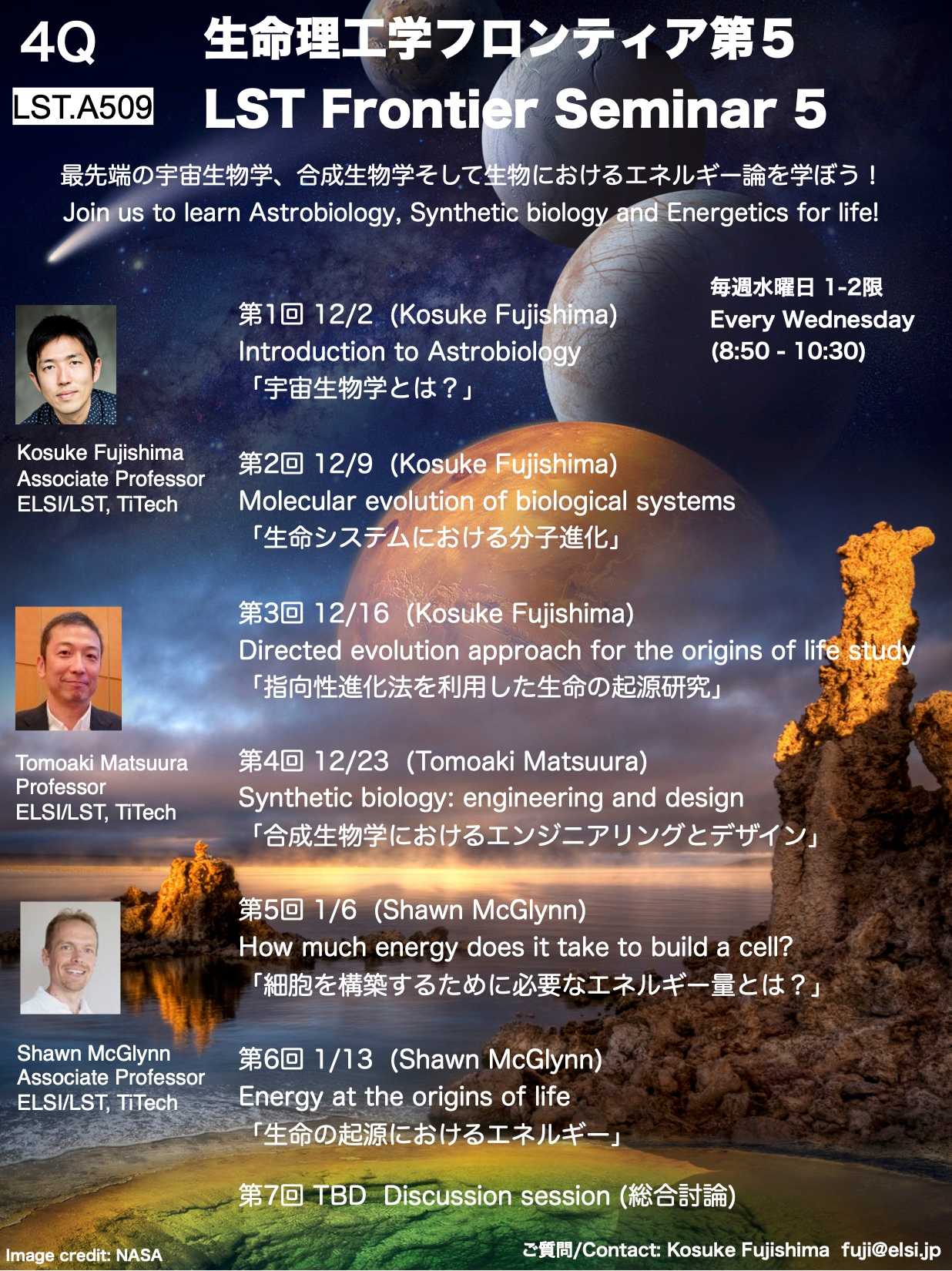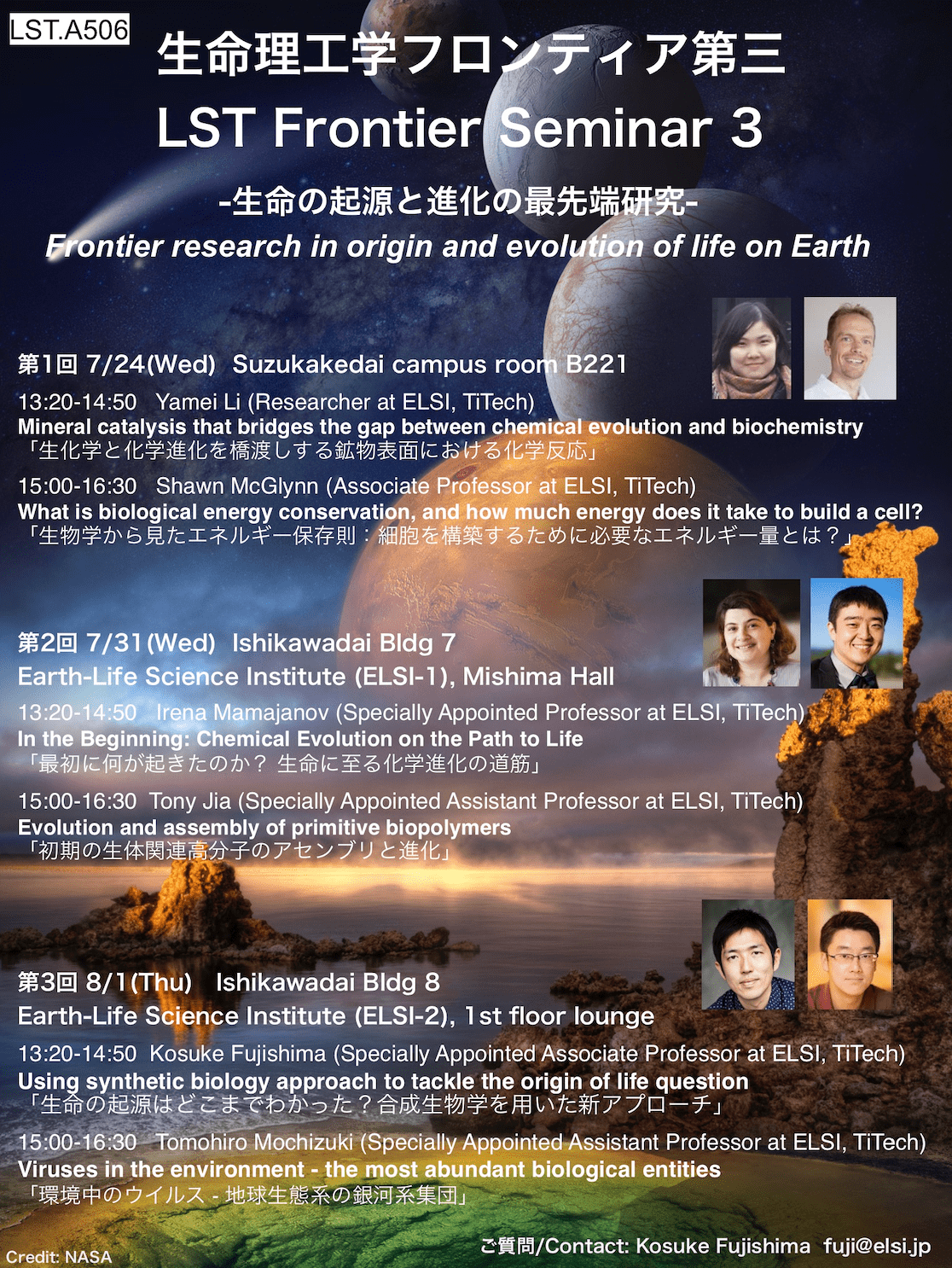東京工業大学 - 担当授業
2022年度(1Q) 地球生命研究基礎特論B (Earth-Life Science B)
本講義は生命科学を軸とした関連分野(分子細胞生物学、生物化学工学、個体群動態、生体エネルギー、合成生物学、宇宙生物学など)における幅広い基礎知識を習得することを目的とする。特に学部時代に生命科学を本格的に学ぶ機会がなかった学生も対象とし、地球生命コースを通じて育成する学際的な人材に向けた基礎作りを行う。
The purpose of this class is to provide students with a wide range of fundamental knowledge in life science and related fields (molecular and cell biology, biochemical engineering, population dynamics, bioenergetics, synthetic biology, astrobiology, etc.). This class is also aimed for students who did not have the opportunity to study life science during their undergraduate period. We expect this class to provide basic knowledge towards becoming an interdisciplinary researcher through the Earth-Life Science graduate course.
2022年度(1Q)合成生物学 (Synthetic Biology)
近年のバイオテクノロジーの発展により、生命システムを人工的にデザイン・設計することが可能となってきた。この分野の研究は合成生物学と呼ばれている。本講義では、合成生物学分野における基礎的な技術とそれが、生命システムのどのような理解につながったのか、どのように社会実装されているかを学ぶ。With the recent development of biotechnology, it has become possible to artificially design and engineer living systems. Research in this field is known as synthetic biology. In this lecture, we will learn the basic techniques in the field of synthetic biology, how they have led to the understanding of living systems, and how they are being implemented in society.
2022年度(1-4Q) 地球生命研究開発プロジェクトM (Research development project for Earth-Life Science M)
本講義は通年で地球科学、環境、宇宙、生命科学などに関連したプロジェクトのグループ演習を通じて、課題設定やその解決の方法について学ぶ。プロジェクトの発案・検討・開発の各段階で必要となる基礎的な知見や、グループでの議論やマネジメントの方法を身につけるとともに、企業と連携することで社会にもインパクトが期待できるような、基礎科学の社会実装の方法論を学ぶことを目指す。
Through group exercises with industries in the fields of space science and life science etc, students learn how to set and solve social problems. In addition to acquiring the basic knowledge necessary for group discussions, students will acquire the skills necessary to implement basic science in society.
2021年度(4Q) 宇宙生物学 (Astrobiology)
アストロバイオロジー(宇宙生物学)とは、NASAが1990年代に作った新しい学術領域であり、宇宙における生命の起源と進化、分布、そして未来という3つの大きなテーマを主軸とした幅広い研究を網羅している。本講義ではアストロバイオロジーに関する幅広い知識や専門用語を習得することを目的とし、天文学、惑星科学、地球化学、環境微生物学、分子生物学をはじめとする異なる分野における鍵トピックを網羅的に学習する。
2021年度(2Q) 合成生物学 (Synthetic Biology)
近年のバイオテクノロジーの発展により、生命システムを人工的にデザイン・設計することが可能となってきた。この分野の研究は合成生物学と呼ばれている。本講義では、合成生物学分野における基礎的な技術とそれが、生命システムのどのような理解につながったのか、
どのように社会実装されているかを学ぶ。
2020年度(4Q) 生命理工学フロンティア第五 (LST Frontier Seminar 5)
本講義は宇宙生物学、合成生物学、エネルギー論について学ぶ集中講義として、12/2, 12/9, 12/16, 12/23, 1/6, 1/13, 総合討論の第7回の講義からなります。藤島准教授に加え、同じくELSI/LSTのPIである松浦教授、McGlynn准教授が登壇します。東工大の大学院生に対して「生命システムの起源と再構成」を軸とする最先端の知見を提供します。
2019年度(1-2Q) 生命理工学フロンティア第三 (LST Frontier Seminar 3)
本講義は「生命の起源」研究に特化した集中講義として7/24, 7/31, 8/1の3日間に渡って行われました。ELSIから計6名の講師/ゲストが参加し、熱力学、地球化学、化学進化、合成生物学、微生物学、ウィルス学など幅広い分野を横断しながら、最先端の知識を学ぶ場を東工大の大学院生に提供しました。
寄附プログラムを通じた教育研究体験
2019
高橋 祐里 (UC Berkeley)
研究テーマ:原始的なRNA結合タンパク質に結合するRNA配列の網羅的探索
My invaluable time spent at ELSI has taught me more career-applicable skills and ways of scientific thinking than I would have through any other college class or systemized internship programs for undergraduates. I believe this was achievable due to the uniquely collaborative and flexible work environment at ELSI. -Yuri Takahashi
-以下、高橋さんの感想文-
I truly underestimated just how much I could learn in the span of just two months.
As a brief introduction, I am an upcoming sophomore at the College of Letters & Science at the University of California, Berkeley. In nature, I am a person driven by scientific inquiry and innovation. I am currently fascinated with both the micro (ex. protein-nucleic acid interactions in biology; neutrinos in physics) and the macro (ex. evolution in biology; cosmology in physics) of science. Thus, I intend to learn about both molecular biology and astrophysics in my undergraduate years—hopefully to pursue a career that uses knowledge and creativity stemming from both fields in the future. In other words, I am very interested in the field of astrobiology and the micro-macro questions it constantly asks, such as: “what patterns in molecular interactions hint at the laws of life, if there exists any?”
This summer, I was able to delve deeper into my budding fascination towards astrobiology at the Earth-Life Science Institute (ELSI) at the Tokyo Institute of Technology. I had the greatest honor to be able work as a research assistant under the kind mentorship of Kosuke and the funding provided by Firstlogic. I took on one of Kosuke’s joint projects with researchers at the Max Planck Institute in Germany: the KHIII project. As an overview, the KHIII project is a mixture of quantitative in vitro search to find target RNA that bind to the KH domain (fold type III) of Thermaerobacter marianensis RNaseG and qualitative analysis of the sequence data of such target RNA. I was mostly involved in the in vitro work and thus learned many laboratory skills in microbiology and molecular biology—spanning from the very basics to the sophisticated. Through coming face-to-face with obstacles and troubleshooting, I acquired the diligence and perseverance expected of a creative researcher.
Despite only having been involved in the KHIII project for approximately three months, I have really come to grasp the grandness and appreciate the significance of the project. The KHIII project is an important puzzle piece in the bigger picture—the potential presence of nucleic acid selection by peptides in the organic-but-prebiotic world of our evolutionary past. It amazes me how I was able to contribute to a project that delves deep into one of the core inquiries of astrobiology: the question of the origin of life on Earth.
My invaluable time spent at ELSI has taught me more career-applicable skills and ways of scientific thinking than I would have through any other college class or systemized internship programs for undergraduates. I believe this was achievable due to the uniquely collaborative and flexible work environment at ELSI. Despite being only a freshman, members of the laboratory were always open to exploring my ideas, which helped me take initiative on the work I was doing. English being the official language at ELSI (which is very rare for a research institute in Japan), the common ground spurred exchange of ideas between researchers of various backgrounds. I attended many seminars during my two months at ELSI – ranging from an Artificial Intelligence boot camp to a presentation on modeling satellite collisions – and conversed freely with researchers working in computer science, mathematics, mineralogy, and many more. It was truly wonderful to be surrounded by motivated and curious people who shared the love of interdisciplinary dialogue.
To emphasize, I would not have been able to experience such a transformative summer without the funding by Firstlogic. Thank you very much for your generous support. Furthermore, I am very grateful to Kosuke, ELSI, and all other laboratory members, as I was able to experience what it means to investigate hands-on while always keeping in mind the big and profound questions that drive the core of science.

